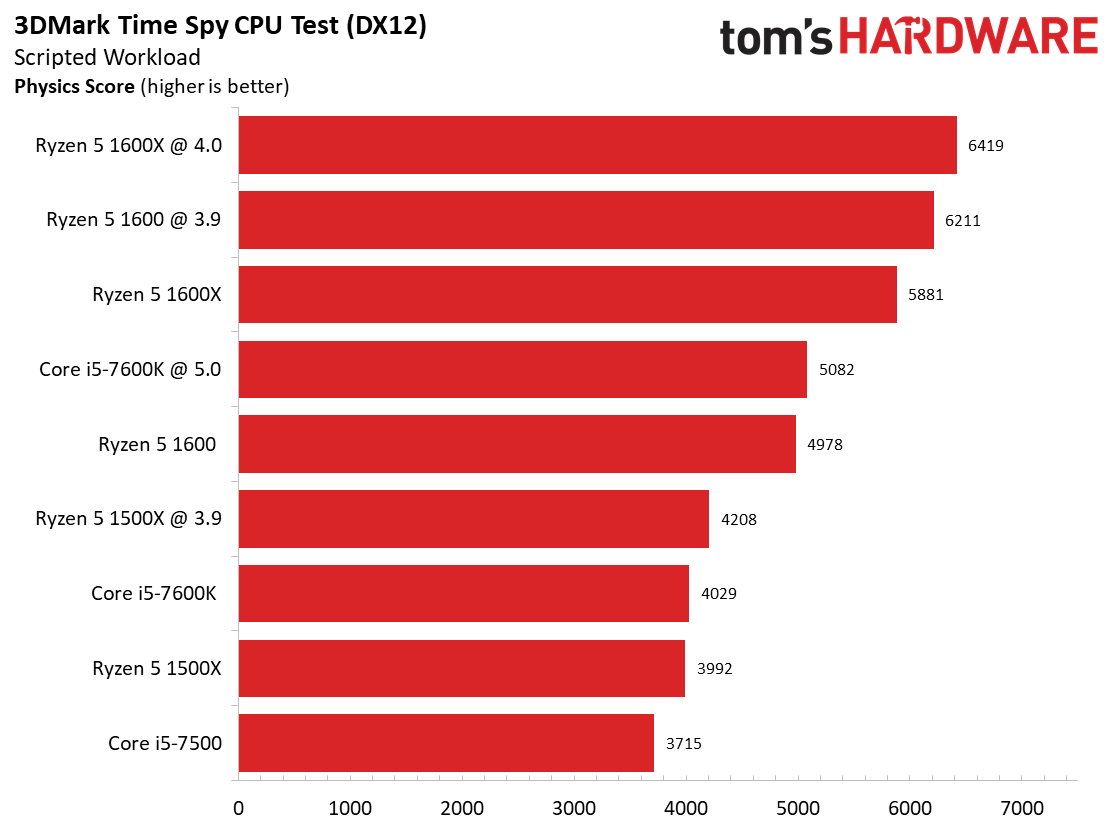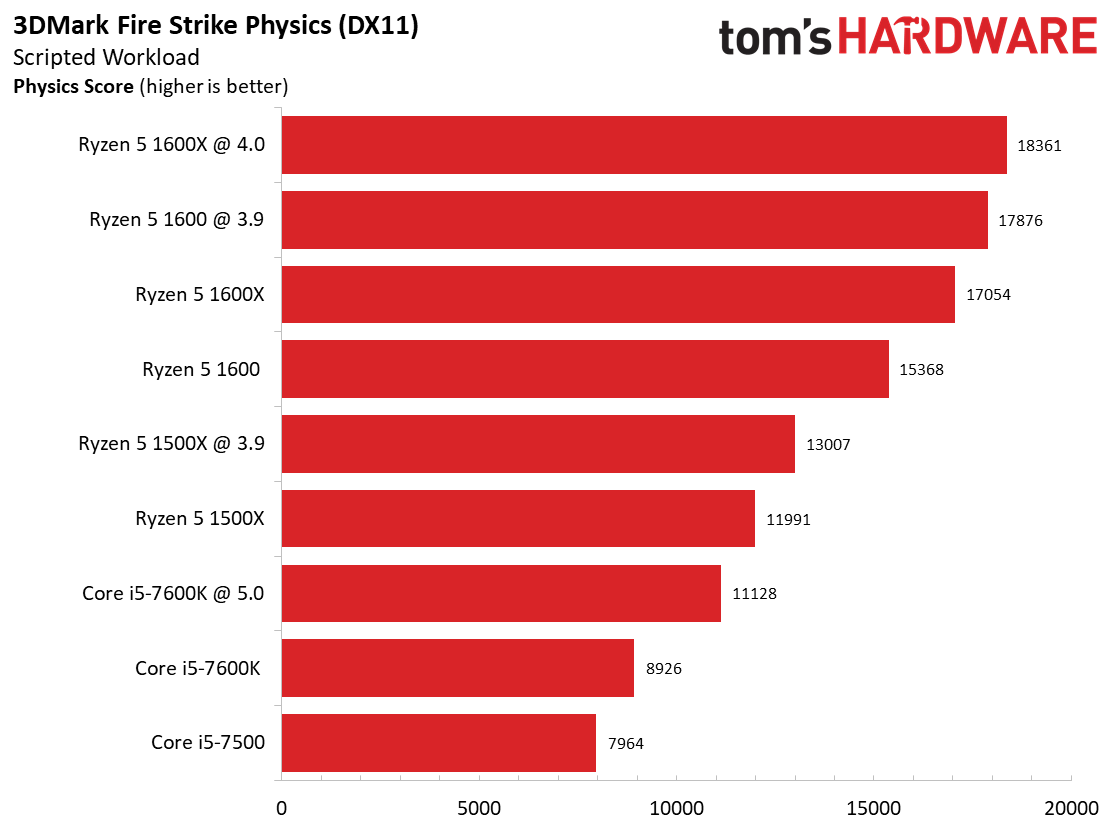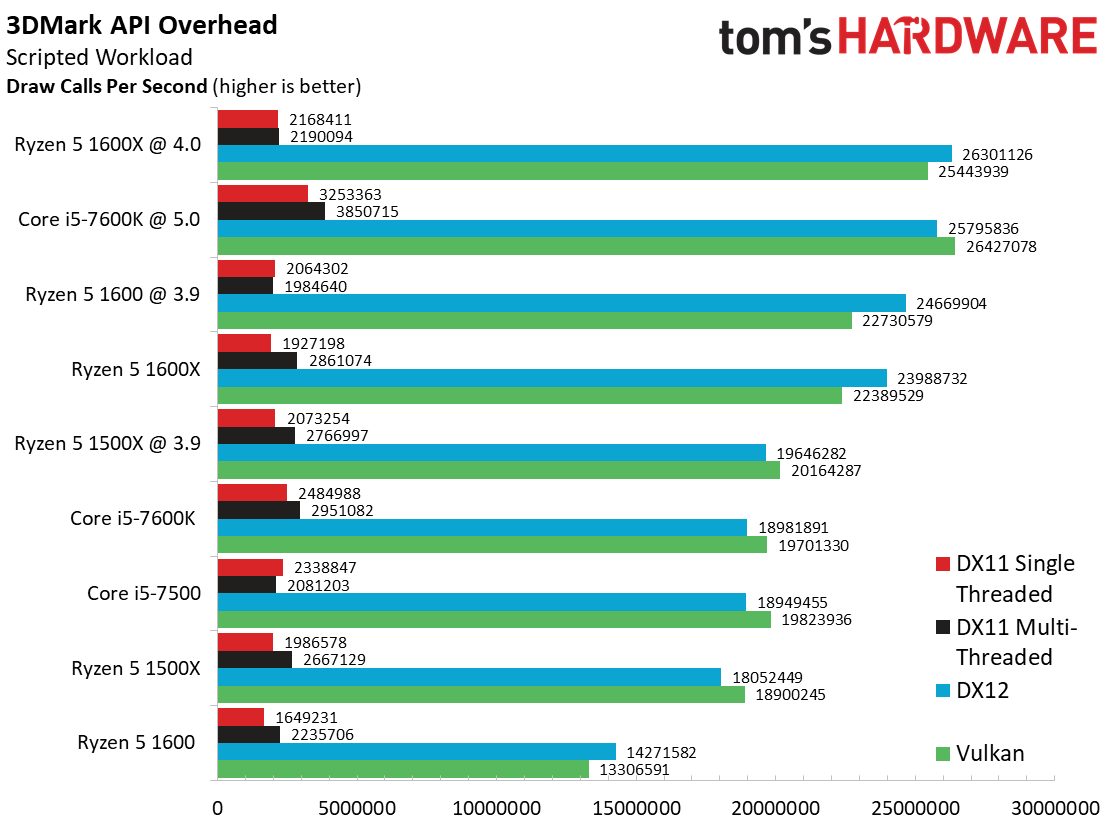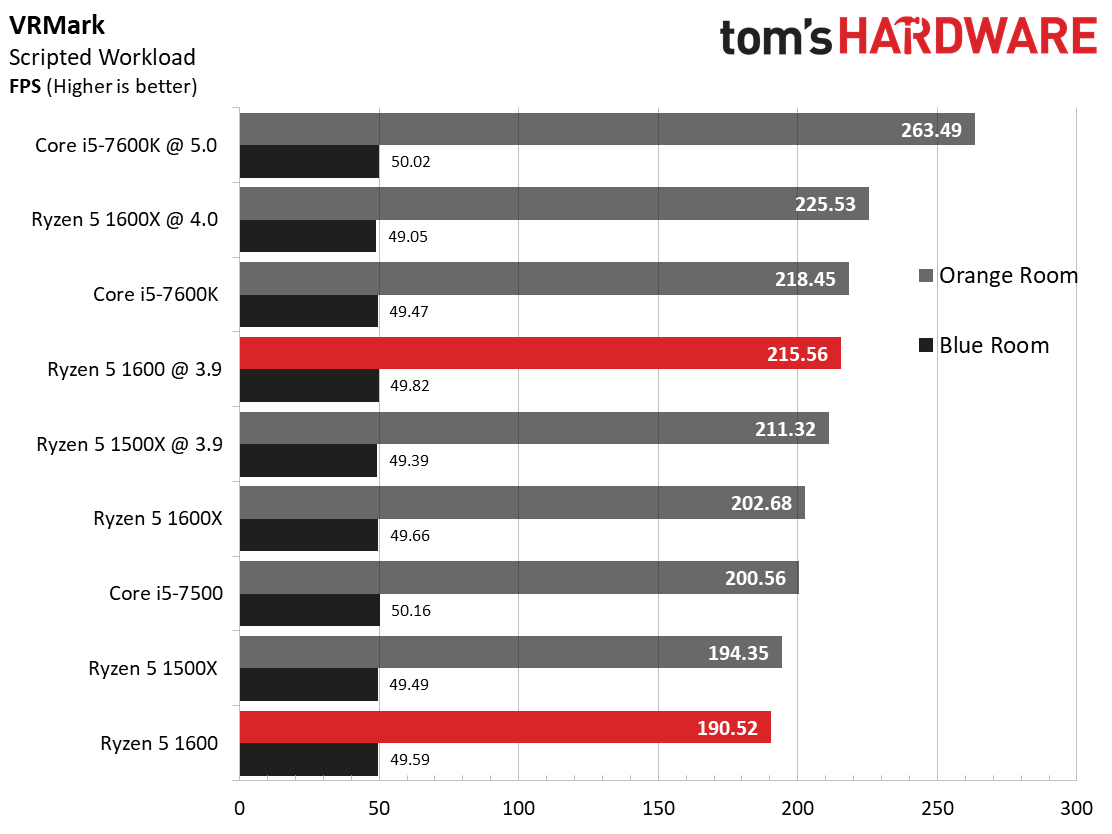AMD Ryzen 5 1600 CPU Review
Why you can trust Tom's Hardware
VRMark & 3D Mark
VRMark
Futuremark's new VRMark test lets you gauge your system's suitability for use with the HTC Vive or Oculus Rift, even if you don't currently own an HMD. VRMark features both HMD and Desktop modes. Desktop mode works both with and without an HMD attached. If you do have one connected, software caps the frame rate at the HMD's refresh rate (90Hz for both the Vive and Rift), and Futuremark doesn't recommend wearing the HMD during the test. We conducted our tests in Desktop mode on a standard monitor, outputting the same resolution and view (for each eye) as an HMD, but without the 90 FPS cap.
The Orange Room test is based on the suggested system requirements for current-generation HTC Vive and Oculus Rift HMDs. Futuremark defines a passing score as anything above 109 FPS (for both tests), so all of these processors paired with a GeForce GTX 1080 are suitable for modern VR experiences.
An overclocked Ryzen 5 1600X outpaces Intel's stock Core i5-7600K, but the overclocked Ryzen 5 1600 lags behind slightly. The Ryzen 5 1600 outpaces its four-core 1500X counterpart, while the Core i5-7500 bests the stock 1500X and 1600.
The Blue Room metric performs a grueling 5K resolution benchmark that mimics the expected performance requirements for future VR devices. It's clear that we're butting up against a graphics bottleneck during the test.
3DMark
3DMark's DX11 physics and DX12 CPU tests quantify the amount of processing power available to a game engine.



The stock and overclocked Ryzen 5 1600X configurations unleash beastly performance during the DX12 physics workload. The 1600 also posts strong results that either beat or challenge the overclocked Core i5-7600K.
AMD's Ryzen processors win the DX11 physics tests. The Intel CPUs fare better during the 3DMark API tests, but Ryzen naturally provides strong threaded DX12 draw call performance.
Get Tom's Hardware's best news and in-depth reviews, straight to your inbox.
As we've come to expect, Intel processors perform well in single-threaded DX11 metrics. Even AMD's overclocked CPUs can't match them there. Strong per-clock performance helps explain Intel's advantage in lightly-threaded benchmarks where Ryzen's core count advantage is neutralized.
Once again, even after Futuremark's recent API test update, we note a reduction in multi-threaded DX11 draw call performance for the overclocked six-core Ryzen processors compared to their stock configurations.
MORE: Best CPUs
MORE: Intel & AMD Processor Hierarchy
MORE: All CPU Content
Current page: VRMark & 3D Mark
Prev Page Overclocking & Test Setup Next Page AotS: Escalation & Battlefield 1
Paul Alcorn is the Editor-in-Chief for Tom's Hardware US. He also writes news and reviews on CPUs, storage, and enterprise hardware.
-
AgentLozen I've been reading the reviews for the various Ryzen models including this one. I just have to say that it's soooo refreshing seeing AMD go toe to toe with Intel once again. We haven't seen a close race in years.Reply -
DavidDisciple 10-4. I was soooooo sick of hearing Intel fanboys brag and belittle AMD and now the tide has turned. It's great to see AMD providing some serious competition and a brand new architecture. It's also great to see an AMD 1st generation processor beat a 7th generation Intel processor.Reply -
barryv88 Finally! Took you guys very long to bring out this article - in what is described by many, the little champ of the Ryzen launch so far. The 1600.Reply
Can't wait to get mine! -
elbert Great review but the big gun was a no show. The 1600's stock cooler and can it do 3.7~3.8Ghz. How does that effect the game price effenciency if we add in cooler costs? How does streaming or just recording the game play for later upload effect performance? How about an older game like CSGO while recording? Can we have a part 2 to this review with these and other tests?Reply -
barryv88 Reply19749170 said:Great review but the big gun was a no show. The 1600's stock cooler and can it do 3.7~3.8Ghz. How does that effect the game price effenciency if we add in cooler costs? How does streaming or just recording the game play for later upload effect performance? How about an older game like CSGO while recording? Can we have a part 2 to this review with these and other tests?
You can check out Bitwit's vid on streaming/recording performance where Ryzen wins rather dramatically. The 7700 is really humbled, given that its 4 extra theads over the i5's don't help either.
https://www.youtube.com/watch?v=oXeenX0FZAY
-
ZRace @Elbert: When streaming, more use is usually being made of having more cores/threads available, so I'd guess the Ryzen CPUs yield better game streaming results compared to pure gaming results when comparing the to the current i5's.Reply -
darth_adversor I'm not an Intel fanboy by any means (I think it's fantastic that AMD is going head-to-head with Intel again), but for gaming, minimum frame-rate data is so much more important than average. The article does make a mention of that toward the end, but I don't think it was emphasized nearly as much as it should have been. I really want AMD to succeed (I was AMD all the way throughout the socket 754, 939, AM2/3 days), but if you look past the author's positive spin, I think the Core i5's are really the way to go for gaming.Reply
Hopefully that will change as the platform matures and the software catches up. I'm still sitting on a 2500k, probably gonna hold out for one more generation before I upgrade. I'd love to go back to AMD. -
DavidDisciple Yeah, and things just keep getting better for Ryzen with all the game optimizations and updates for memory compatibility and manufacturers like ROG are adding them in their performance gaming systems. Things are looking pretty good for Ryzen.Reply -
JocPro Hey, Paul: AMD has never said that non X processors lack XFR, they just have a more limited extra boost of 50-100 MHz instead of the 100-200 MHz in the X models...Reply -
Paul Alcorn Reply19749289 said:Hey, Paul: AMD has never said that non X processors lack XFR, they just have a more limited extra boost of 50-100 MHz instead of the 100-200 MHz in the X models...
I have marketing materials (reviewers guides, press releases, slides from briefings, etc.) that say, specifically and repetitively, that XFR is only on X SKUs.
